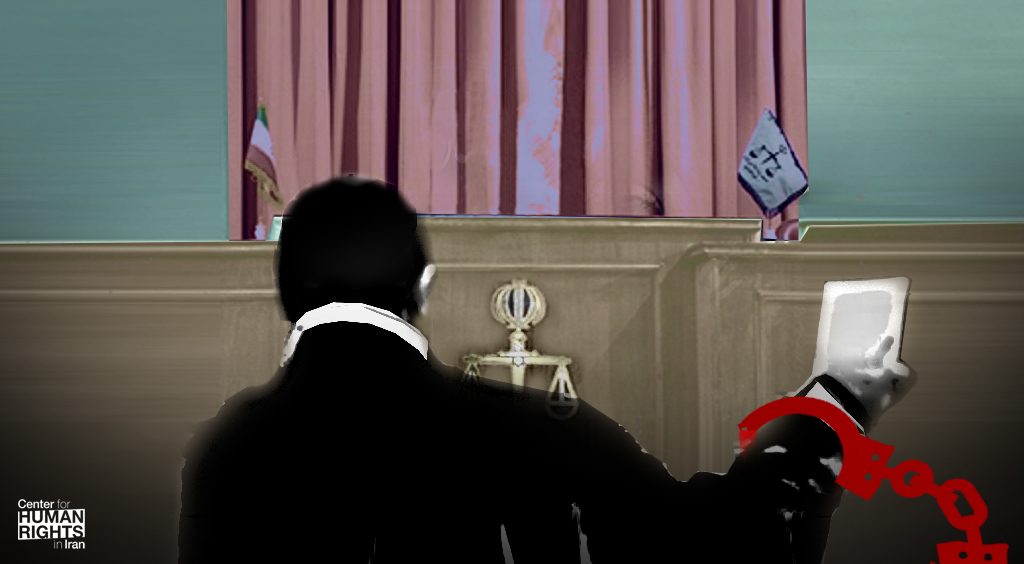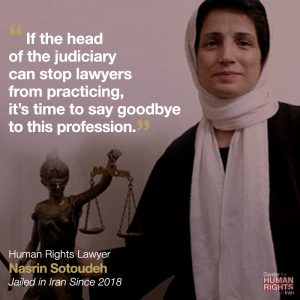No Lawyers, No Justice: Attorneys Imprisoned in Iran for Defending Human Rights

At Least Nine Defense Attorneys Sentenced to Prison Since 2018
June 23, 2020 – Two years after the prominent human rights attorney Nasrin Sotoudeh was arrested and imprisoned in Tehran, the Iranian judiciary’s continuing prosecution of independent lawyers under manufactured charges is laying bare the state’s disregard for international standards of law and due process.
“The courts are colluding with intelligence agencies to go after lawyers so that any last hopes for defending due process are extinguished, with the tacit approval of Judiciary Chief Ebrahim Raisi and the Rouhani government,” said Hadi Ghaemi, executive director of the Center for Human Rights in Iran (CHRI).
At least five human rights attorneys are currently imprisoned in the country for defending basic civil liberties under trumped-up charges.
They are among a group of at least nine known cases of attorneys that have been arrested, charged with national security-related crimes, and/or banned from practicing law in the last two years.
In addition to the list below, CHRI maintains this regularly updated list of lawyers known to have been imprisoned in Iran for their work defending the law.
Rights Attorneys and Activist Sentenced to Prison
Payam Derafshan: Held incommunicado at an unknown location since his arrest in June 2020 on unannounced charges. In May 2020, he was sentenced to a one-year suspended prison sentence for“insulting the supreme leader,” and suspended from practicing law for two years.
*Soheila Hejab: (Editor’s Note: Hejab has a law degree, but is not a practicing lawyer). Held at Gharchak Prison since May 2020, serving an 18-year prison sentence, five of which she must serve before becoming eligible for parole for “forming a group for women’s rights.”
 Nasrin Sotoudeh: Detained in June 2018 and sentenced to 38 years in prison, 12 years of which she must serve before becoming eligible for parole. Among her charges were “encouraging prostitution” for advocating against compulsory hijab. Previously she served three years in prison for “acting against national security” and “membership in the Defenders of Human Rights Center.”
Nasrin Sotoudeh: Detained in June 2018 and sentenced to 38 years in prison, 12 years of which she must serve before becoming eligible for parole. Among her charges were “encouraging prostitution” for advocating against compulsory hijab. Previously she served three years in prison for “acting against national security” and “membership in the Defenders of Human Rights Center.”
Mohammad Najafi: Imprisoned for demanding accountability for deaths in detention and facing new unspecified charges, he was sentenced in 2019 to 13 years in prison for “propaganda against the state,” “insulting the supreme leader,” and “collaborating with enemy states,” in addition to a four-year prison sentence in 2018. He must serve 10 years before becoming eligible for parole.
Amirsalar Davoudi: Behind bars since November 2018, he was sentenced to 30 years in prison and 11 lashes. He will be eligible for release after serving 15 years under the charge of forming “an illegal group,” which was a news channel for lawyers on the Telegram messaging app.
Arash Keykhosravi, who, along with fellow lawyer Ghasem Sholeh Sa’di, was sentenced to six years in prison but later acquitted, is facing new charges of “publishing falsehoods” for writing an article criticizing the imprisonment of attorney Mohammad Najafi.
Abdolfattah Soltani, who spent more than seven years behind bars for defending political prisoners, and Mohammad Ali Dadkhah, who was sentenced in 2012 to nine years in prison but released on furlough in 2013, are both banned from practicing law.
Ongoing Refusal to Abide by International Standards of Due Process
The assault on rights lawyers in Iran has been occurring amid a backdrop of two major changes to the legal process that have facilitated the authorities’ ability to convict defendants in politically motivated prosecutions on unsubstantiated charges.
In January 2018, Iranian courts began citing the Note to Article 48 of Iran’s Criminal Procedures Regulationsas justification for forcing defendants to choose their legal counsel from a court-approved list. The note also allows a delay in an individual’s access to counsel in cases involving “national security” charges, which are used against perceived critics of the state.
In a second blow to due process, in November 2019, Judiciary Chief Ebrahim Raisi ruled that Appeal Courts could issue verdicts without the presence of defendants and their attorneys, rendering the appeal process effectively meaningless.
“If the head of the judiciary can stop lawyers from practicing, it’s time to say goodbye to this profession,” Sotoudeh said in 2018. She was arrested two months after making the comments and has been behind bars ever since.
Click here for a current list of lawyers who’ve been sentenced to prison in Iran.
*This article was revised on March 2, 2022, to note that Soheila Hejab is an activist with a law degree, not a practicing lawyer.






